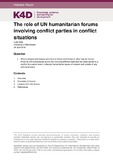| dc.contributor.author | Kelly, Luke | |
| dc.coverage.spatial | Sudan | en |
| dc.coverage.spatial | Angola | en |
| dc.coverage.spatial | Mozambique | en |
| dc.coverage.spatial | Bosnia | en |
| dc.coverage.spatial | Syria | en |
| dc.date.accessioned | 2019-05-14T11:21:58Z | |
| dc.date.available | 2019-05-14T11:21:58Z | |
| dc.date.issued | 2019-04-26 | |
| dc.identifier.citation | Kelly, L. (2019). The Role of UN Humanitarian Forums Involving Conflict Parties in Conflict Situations. K4D Helpdesk Report. Brighton, UK: Institute of Development Studies | en |
| dc.identifier.uri | https://opendocs.ids.ac.uk/opendocs/handle/20.500.12413/14492 | |
| dc.description.abstract | This query studies the role of regular UN humanitarian forums that involve conflict parties in conflict situations to discuss humanitarian issues of concern. It focuses on forums that are held outside of any political processes or peace talks. This paper finds six examples of forums that meet two or more of the criteria, although several of these are informal and/or linked to a political process. Forums such as the Technical Committee on Humanitarian Assistance (TCHA) in Sudan (1998-2000) and the Nuba Mountains Programme Advancing Conflict Transformation (NMPACT) in Sudan (2002-2007) have allowed humanitarian issues to be discussed in a co-ordinated way among United Nations (UN) organisations and/or Non-Governmental Organisations (NGOs) and parties to the conflict. This can lead to better technical co-ordination, a distribution of aid according to humanitarian principles rather than strategic negotiations, and a greater acceptance of humanitarian principles among the warring parties. However, literature shows that the success of such forums is highly context-specific and depends upon their format, personnel and tactics, as well as the broader political context and the tactics and capabilities of the conflict parties. The forums risk legitimising the conflict parties and allowing aid to be instrumentalised. Some key challenges shape the space humanitarian actors have for engaging in regular forums with conflict parties. Firstly, so called “complex emergencies” after the Cold War have changed the context for humanitarian action, and brought distinct challenges to implementing humanitarian principles and maintaining humanitarian space. Secondly, the UN introduced a policy of integration in 1997 whereby UN peacekeeping, security and humanitarian agencies are linked together. Evidence from interviews points to a perception that aid is linked with UN political goals in contexts such as Somalia and Afghanistan and a subsequent reduction in the efficacy of aid delivery. Humanitarian organisations and the UN have tried various methods to overcome these problems, including co-ordination mechanisms and the formation of joint operating principles. | en |
| dc.language.iso | en | en |
| dc.publisher | IDS | en |
| dc.relation.ispartofseries | K4D Helpdesk Report;585 | |
| dc.rights.uri | https://www.nationalarchives.gov.uk/doc/open-government-licence/version/3/ | en |
| dc.subject | Aid | en |
| dc.subject | Rights | en |
| dc.subject | Security and Conflict | en |
| dc.title | The role of UN Humanitarian Forums Involving Conflict Parties in Conflict Situations | en |
| dc.type | Helpdesk | en |
| dc.rights.holder | © DFID - Crown copyright 2019 | en |
| dcterms.dateAccepted | 2019-04-26 | |
| rioxxterms.funder | Department for International Development, UK Government | en |
| rioxxterms.identifier.project | K4D | en |
| rioxxterms.version | VoR | en |
| rioxxterms.funder.project | 238a9fa4-fe4a-4380-996b-995f33607ba0 | en |

